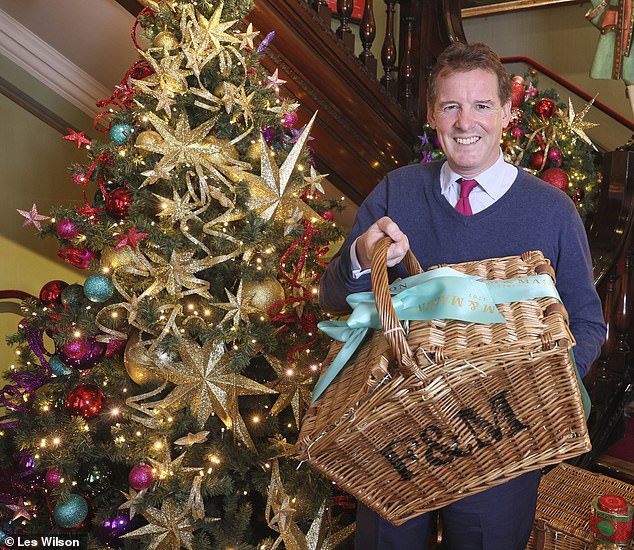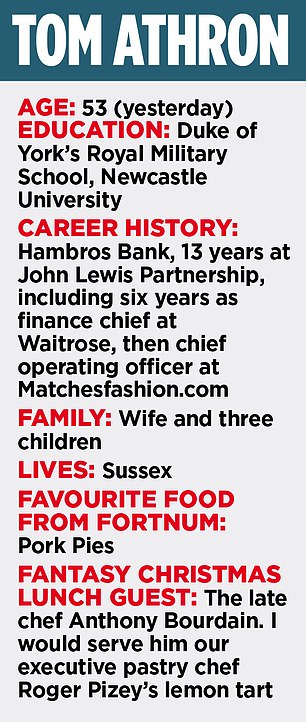Tom Athron is snug on a sofa in the Three and Six Bar on the third floor of Fortnum & Mason, just a few steps away from the home of the shop’s world-famous hampers. From there, the chief executive of the famous London store can look out over ‘the home of hampers’ where teams are packing wicker baskets with delicacies, ready to be delivered all around the world.
Customers can buy a pre-packed one or create their own with help from one of the store’s Red Coats. These specialist members of staff are several degrees upmarket of the Butlin’s variety.
Their scarlet jackets are a nod to the bright livery the store’s co-founder William Fortnum wore when he served as a footman in the court of Queen Anne.
The Three and Six Bar – signposted in store as the 3’6 – is so named because in the 1950s Fortnums would throw a cocktail party at a customer’s home and charge three shillings and sixpence – equivalent to 17½p in decimal coinage – per drink. ‘I don’t know how much I would charge now,’ Athron admits.
There is no denying that the Piccadilly store is a beguiling kingdom of its own. But isn’t this temple to expensive consumption an affront in a cost of living crisis, when discount chain Aldi is promoting Christmas dinner for six for less than £16?

Festive: Tom Athron showcases Fortnum’s world-famous hampers in its Piccadilly store in central London
Athron shrugs this off. ‘Our customer base is very broad,’ he says. ‘If you want something stunning and gorgeous, we have it.
‘You can spend £5.95 on jam and it is literally the world’s best jam. When times are tough that little moment of luxury is all the more attractive.’
Hair shirt types may not approve, but the store is unapologetically rarefied.
The newly-designed bar, Athron says, was designed by Arthur Mamou-Mani, an achingly trendy architect who designed the stunning Galaxia Temple unveiled at the 2018 Burning Man festival in Nevada.
‘The stools are 3D printed and this bar is made out of sugar,’ he says. ‘Don’t lick it.’
Wandering round the store, Athron, who has been chief executive since 2020, says hello by name to Fenella, one of the 167 temporary staff he has hired for the festive season from more than 1,000 who applied. ‘I don’t know the names of all of them,’ he admits.
The additional staff are certainly needed. In the countdown to Christmas they are expecting 35,000 customers each day.
The third floor has had a makeover and menswear has gone. As well as hampers and the bar, there is a food and drink studio. ‘We have 100 chefs in this building,’ Athron says. ‘It was an opportunity to bring them out from behind the walls and let them show off their mastery in front of customers.
‘In the morning they are doing mise-en-place for the tea salon so they are dipping choux or piping macarons, and you can see them do it. In the afternoon there might be a masterclass on how to make the perfect beef Wellington or how to tablescape for Christmas.’
Customers planning a quality tablescape will need the right kit, which they can find in the kitchenware department, where £150 handmade knives from Savernake in Wiltshire have a blade that will slice cucumber and strawberries to put in your Pimm’s.
A little encourage around is a distillery where the store produces its own gin.
‘I was talking to the Mexican ambassador and we thought we might do a mescal together,’ says Athron. I didn’t dare ask if there were any Ferrero Rocher.
The copper still is known in-store as Amalthea – after the goat in Greek mythology which fed the infant Zeus and whose horn became the cornucopia.
The horn of plenty is a fitting symbol for Fortnums, where every form of edible or drinkable luxury imaginable can be found in abundance.
The reference to myth and legend at the distillery is not accidental. Virtually every part of the store and every product has a story.
The shop itself was founded in 1707 by William Fortnum and his landlord Hugh Mason. ‘William asked permission to take melted candles that had not been fully used from the court,’ says Athron. ‘He turned the beeswax into new candles. This business is founded on a recycling idea.
‘We have four beehives on the roof and we are making honey from them for sale in the shop.’
Fortnums sets out to create a sense of enchantment and wonder, but it is also a serious business that supports small UK food and drink producers.
‘About 85 per cent of our product is made in the UK,’ says Athron. ‘The only products from outside are the wines and cheeses.

‘All our tea is sailed up the Tyne and is blended in Newcastle by a family firm we’ve been using for years. All our biscuits are made by a family business in Lancashire that has been supplying us for 40 years and all our handmade chocolates are made by a family business in Hove that has been supplying us for 60 years.
‘These are really important relationships for us because we believe these are the best chocolates, tea and biscuits in the world.’
His own favourite bite is a large pork pie which costs £7.95. ‘I am obsessed,’ he smiles.
Prices in the store are undeniably high, with the most expensive off-the-shelf hamper costing about £6,000. It all seems a bit Marie Antoinette in the middle of an economic slump when millions are struggling to make ends confront.
But it’s also a chance to escape, however briefly, into another world and maybe indulge in one of the – relatively speaking – affordable offerings. Failing that, people can come just for the spectacle of Christmas puddings dancing above the atrium and to perceive members of the 1 per cent doing their seasonal food shop.
The fabled window display this year shows products coming to life, with waltzing tea caddies and champagne bottles that swim.
‘I’m not telling you how much we spend on the windows, but we start a year in advance,’ Athron reveals.
The store swung back to a £6 million profit last year after losses during Covid. Sales are strong, with 35 to 45 per cent made online, compared with about 10 per cent pre-pandemic.
The success of the bricks-and-mortar store, Athron says, is down to the unique experiences it offers. ‘Our approach is very different from the normal way of running a retail business, which is all about sales per square foot.
‘For me, the future of department stores is creating an encounter you can only have here.
‘Our strategy is to be more relevant to more people more often. Everyone thinks of Fortnums as a Christmas business, but we eat food every day, not just on December 25th.’
Some links in this article may be affiliate links. If you click on them we may earn a small commission. That helps us fund This Is Money, and keep it free to use. We do not write articles to encourage products. We do not allow any commercial relationship to affect our editorial independence.



